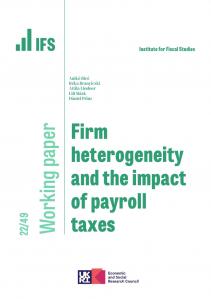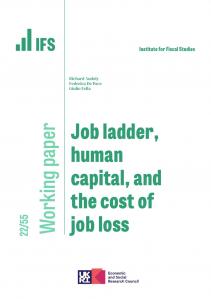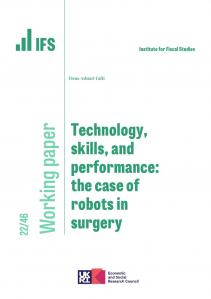How does firm entry affect innovation incentives and productivity growth in incumbent firms? Micro-data suggests that there is heterogeneity across industries - incumbents in technologically advanced industries react positively to entry, but not in laggard industries. To explain this pattern, we introduce entry into a Schumpeterian growth model with multiple sectors which differ by their distance to the technological frontier. We show that entry threat spurs innovation incentives in technologically advanced sectors - successful innovation allows incumbents to prevent entry. In laggard sectors it discourages innovation - increased entry reduces incumbents' expected rents from innovating. We find that the empirical patterns hold using rich micro-level productivity growth and patent panel data for the UK, and controlling for the endogeneity of entry by exploiting the large number of policy reforms undertaken during the Thatcher era.
Authors

CPP Co-Director
Richard is Co-Director of the Centre for the Microeconomic Analysis of Public Policy (CPP) and Senior Research Fellow at IFS.

CPP Co-Director, IFS Research Director
Rachel is Research Director and Professor at the University of Manchester. She was made a Dame for services to economic policy and education in 2021.

Susanne Prantl

Research Fellow London School of Economics
Philippe is an IFS Research Fellow, a Professor of Economics at LSE, at the College de France and at INSEAD, and a Fellow at the Econometric Society.

Peter Howitt
Report details
- Publisher
- Centre for Economic Policy Research
Suggested citation
Aghion, P et al. (2005). The effects of entry on incumbent innovation and productivity. London: Centre for Economic Policy Research. Available at: https://ifs.org.uk/publications/effects-entry-incumbent-innovation-and-productivity (accessed: 30 June 2024).
Related documents
More from IFS
Understand this issue

Spring Budget 2024: What you need to know
7 March 2024

If you can’t see it, you can’t be it: role models influence female junior doctors’ choice of medical specialty
24 April 2024

The NHS waiting list: when will it come down?
29 February 2024
Policy analysis

How do the last five years measure up on levelling up?
19 June 2024

The Conservatives and the Economy, 2010–24
3 June 2024

A decade and a half of historically poor growth has taken its toll
3 June 2024
Academic research

Firm heterogeneity and the impact of payroll taxes
24 November 2022

Job ladder, human capital, and the cost of job loss
13 December 2022

Technology, skills, and performance: the case of robots in surgery
7 November 2022